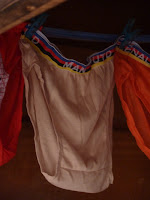I arrived in Mzuzu late on Wednesday September 1st. Even in the first few days I have already gained a great insight into the quirks of getting business done in Africa.
On Friday evening at the end of my first week we got a call to say that two lorries containing donated solar panels from the US had arrived at the Malawian border (they were at the last stage of their journey coming overland from Tanzania) and would be in Mzuzu by morning. Karel, the Macro Solar manager, had been waiting for this news for months and so on Saturday morning me and Karel headed off to try and get the stock unloaded, counted and inspected for any damage so that we could make an insurance claim if required. And so began my initiation into the ‘African’ way of doing things! We arrived at the MRA – the Malawian Revenue Authority to find out how much import duty would be payable. A quick flick through the Malawian Customs and Export Act revealed that our solar panels fell under section 85.41 and attracted duty at 30%. However further inspection revealed that this was the 2007 version of the Act and that subsequent issues had abolished duty on solar panels. VAT was still payable though as apparently VAT exemption proceedings had begun but nobody was anticipating that materialising sometime soon (or ever?). We then faced a tripartite of stumbling blocks. Firstly we needed a tax registration number which we would find on the documentation from the last import. We went to the SolarAid office and found it. Unfortunately it wasn’t this number that they wanted but a consignment number. Therefore another dash back to the office was required to find a further number. By now it was 10.50am. Problem number two was that the banks close on Saturday at 11.00am and in order for us to open the containers holding the panels we would have to present a certified cheque for the tax amount due to the MRA so that two MRA officials could accompany us in overseeing the opening of the containers. Karel dashed to the bank – then I noticed that the costs had been calculated on a GBP base rather than a EUR base so at the MRA we recalculated and got a message via text through to Karel at the bank to change the amount on the cheque. While I waited at the MRA a senior official asked me in to his office for a conversation. I didn’t really know what to expect. He explained that he had seen what we were importing and wanted to enquire about buying one of the panels for his village. I explained that unfortunately they were not for sale commercially and were all earmarked for projects decided on by a selection process. Encouraging to see the interest in solar power though.
Also encouraging to see were the latest amendments to the Malawian Customs and Excise Act which were heavily promoting the use of green energy by abolishing duty on energy saving light bulbs but applying 100% duty to old style lightbulbs and batteries. Other amendments indicated the government desires to promote local production by increasing duty on imported soft drinks and thread.
I have digressed a little but it was a long wait at the MRA for Karel to return and in fact the third and fatal stumbling block was that the MRA itself shuts at 12 on a Saturday. With no cheque in sight they shut up shop and I was turfed out of the office and the compound and left to sit on the kerb waiting for Karel to return and give him the bad news. This meant that the containers could now not be opened until Monday morning and in the meantime the Tanzanian lorry drivers who need to return with the containers now needed to be accommodated and fed over the weekend.
It may have felt frustrating but really it was just the fact that the panels arrived on a Friday night that hindered us. Any tax authority in the world would require the organisation’s registered tax number in order to administrate a request and the MRA itself has a duty to prevent fraud by insisting on a certified cheque rather than cash being handed over so I am focussing on the positives at the MRA.





